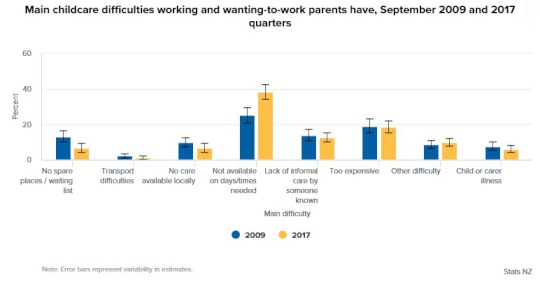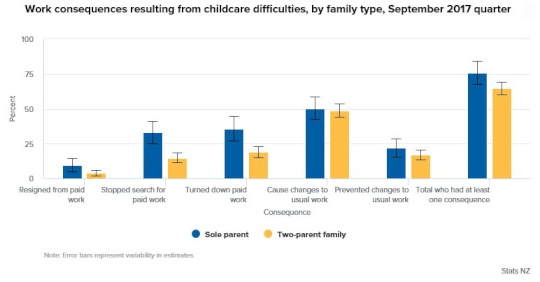Childcare a challenge for 1 in 6 working parents
Not having care available when they needed it was the main childcare difficulty (38 percent) for parents who worked, or wanted to work, Stats NZ said today. Care being too expensive was their next main difficulty (19 percent).
“Many working parents use childcare arrangements to make their work possible. However, there’s a group who experience difficulties getting childcare when they’re at work or wanting to work. More flexible childcare arrangements may help parents take up work opportunities,” labour market and household statistics senior manager Jason Attewell said.
The Childcare in New Zealand Survey, a supplement to the Household Labour Force Survey in 2017, asked parents of children 13 years and younger about their children’s care arrangements, and their own work and study. Those who worked or had wanted to work in the last 12 months were asked about any difficulties getting childcare and any work-related consequences of those difficulties.
The 2017 survey found that 16 percent of all parents who worked or wanted to work had difficulties getting childcare. A lack of available care at the times needed was the main childcare difficulty for 38 percent of parents, up from 25 percent in 2009. Just 6.7 percent of parents reported ‘no spare places available’ as their main difficulty in 2017, down from 13 percent in 2009.

In 2017, nearly a quarter of mothers (23 percent) experienced difficulties getting childcare while working or wanting to work, compared with 9.3 percent of fathers.
Sole parents were more likely to have difficulties (27 percent) than those in two-parent families (14 percent) in 2017. For sole parents, 44 percent reported their main difficulty was care not being available at the times needed, up from 25 percent in 2009.
Childcare difficulties lead to work consequences
More than two-thirds (68 percent) of
parents who experienced difficulties getting childcare in
2017 also experienced work-related consequences due to those
difficulties. For this group:
• 49 percent made changes
to their usual work
• 23 percent turned down paid
work
• 20 percent stopped searching for paid
work
• 18 percent were prevented from making changes to
their usual work
• 5.3 percent resigned from paid
work.
Note: Parents may report more than one type of work-related consequence.

As a result of their childcare difficulties, sole parents were more likely to turn down paid work, or to stop searching for paid work, than those in two-parent families. In 2017, 36 percent of sole parents turned down paid work and 33 percent stopped searching for paid work – compared with 19 percent and 15 percent of parents in two-parent families, respectively.
Due to childcare difficulties, mothers were more likely to turn down paid work (27 percent of mothers) and stop searching for paid work (22 percent) than fathers (14 percent and 12 percent, respectively).
Ends


 Gordon Campbell: On The Mock Horror Over Political Profanity
Gordon Campbell: On The Mock Horror Over Political Profanity NZ Customs Service: Man Sentenced To 4 Years & 9 Months’ Imprisonment Following Customs Investigation Into Child Sexual Abuse Material
NZ Customs Service: Man Sentenced To 4 Years & 9 Months’ Imprisonment Following Customs Investigation Into Child Sexual Abuse Material Human Rights Commission: Human Rights Commissioner Says The Cost Of Limiting Gender Rights Under Legislation Will Be People's Lives
Human Rights Commission: Human Rights Commissioner Says The Cost Of Limiting Gender Rights Under Legislation Will Be People's Lives New Zealand Government: Social Security Amendment Bill Passes Into Law
New Zealand Government: Social Security Amendment Bill Passes Into Law Independent Police Conduct Authority: IPCA Investigations Relating To The Conduct Of Former Deputy Commissioner McSkimming
Independent Police Conduct Authority: IPCA Investigations Relating To The Conduct Of Former Deputy Commissioner McSkimming PSA: New Public Research Organisation Boards Dominated By Men
PSA: New Public Research Organisation Boards Dominated By Men UNICEF Aotearoa NZ: New Global Data - New Zealand Ranks Alarmingly Low For Child Wellbeing, Mental Health
UNICEF Aotearoa NZ: New Global Data - New Zealand Ranks Alarmingly Low For Child Wellbeing, Mental Health 


